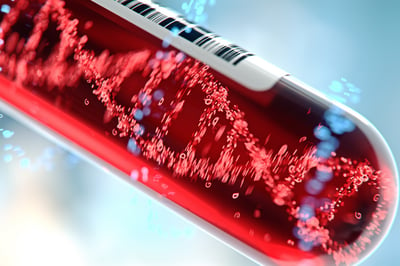FORCE's eXamining the Relevance of Articles for You (XRAY) program looks behind the headlines of cancer news to help you understand what the research means for you.
XRAY is a reliable source of hereditary cancer research-related news and information.
Learn more about the XRAY program
Categories Genetic Testing
Relevance: High


Strength of Science: High


Research Timeline: Post Approval


Study : New cancer risk estimates for BRCA1/2 mutation carriers
Relevance: High


Strength of Science: High


Research Timeline: Post Approval


Most relevant for: Women with an inherited mutation in BRCA1 or BRCA2
Cancer risk estimates for BRCA1 and BRCA2 mutation carriers are important because they impact patient decision-making. Until now, almost all risk estimates for mutation carriers were based on results of retrospective studies that looked back on mutation carriers who had cancer. This new study is prospective—it followed almost 10,000 BRCA mutation carriers without cancer to see if or when they developed breast or ovarian cancer. The cancer risk estimates of this study may be more accurate because it followed mutation carriers who did not have cancer over time. (7/28/17)
Read More
Study : Gaps in genetic testing and decision-making for women with early-stage breast cancer
Most relevant for: People diagnosed with early stage breast cancer
Genetic testing for cancer risk is now more affordable and easier to obtain. As a result, many breast cancer patients are tested without ever seeing a genetic counselor. Genetic testing results affect treatment decision making, but they can be confusing, especially if patients do not receive genetic counseling. This study looks at breast cancer patients’ experiences following genetic testing and how testing results affect surgical decision making. (7/14/17)
Read More
Relevance: High


Strength of Science: Medium-High


Research Timeline: Post Approval


Study : Patient experiences with genetic testing
Relevance: High


Strength of Science: Medium-High


Research Timeline: Post Approval


Most relevant for: Women diagnosed with early-stage breast cancer
Patients can now find out if they have a mutation in more than 20 different genes that are associated with cancer risk, thanks to research advances and the decreasing cost of genetic testing. However, patients’ experiences and use of genetic counseling and testing with these changes are unknown. Do patients want genetic testing? Are they getting tested? (3/7/17)
Read More
Study : Angelina Jolie spoke out on BRCA testing: Did genetic testing increase?
Most relevant for: People interested in genetic testing for an inherited mutation
Angelina Jolie published an editorial in the New York Times in 2013 about her choice to have a double mastectomy after finding out she was positive for a BRCA1 mutation. Researchers from a recent study claim that her celebrity endorsement of BRCA testing may have missed its target audience (previvors), due to the increase in BRCA testing following publication of the editorial but a decrease in the number of mastectomies performed. However, the study failed to take into account that many women without breast cancer do not pursue mastectomy in the months following genetic testing. (1/4/17)
Read More
Personal Story : Why one woman passed on genetic testing
Most relevant for: People considering genetic testing and people who are Ashkenazi Jewish
What are reasons to get or not get genetic testing? Cynthia Graber gives her thoughts on the matter in her Wired opinion piece, "Why I Won't Get the Genetic Test for Breast Cancer." (11/15/16)
Read More
Relevance: Medium-High


Strength of Science: Medium


Research Timeline: Post Approval


Study : Rare mutations in PALB2, CHEK2, and ATM: how much do they increase cancer risk?
Relevance: Medium-High


Strength of Science: Medium


Research Timeline: Post Approval


Most relevant for: People who tested positive for one of the rare variants in CHEK2, ATM or PALB2 that are covered in this study
As multi-gene panel tests become more common, people are discovering they have mutations in genes that are not understood as well as BRCA. This can make it difficult to give patients accurate assessments of their cancer risk. For example, mutations in PALB2, CHEK2, and ATM are rare, but some specific changes in these genes are even less common. The goal of this international collaboration was to better understand the cancer risks of some very rare PALB2, CHEK2, and ATM mutations. The findings are relevant only to the specific mutations covered in this paper and do not apply to all people with mutations in PALB2, CHEK2, or ATM. (9/27/16)
Read More
Relevance: Medium-High


Strength of Science: Medium-High


Research Timeline: Post Approval


Study : Racial disparities in BRCA testing: Why?
Relevance: Medium-High


Strength of Science: Medium-High


Research Timeline: Post Approval


Most relevant for: African American women who have been diagnosed with breast cancer
Black women receive BRCA testing less frequently than white women. Why is that? Researchers thought the reason might be that black and white women see different health care providers. However, new research suggests that disparities in physician recommendations for testing are the cause: black women with breast cancer were less likely to receive physician recommendations for BRCA testing than white women with breast cancer. There is a need to ensure equity in physician testing recommendations for black women. (7/21/16)
Read More
Relevance: Medium


Strength of Science: Medium


Research Timeline: Human Research


Study : Is breast cancer risk increased in women who test negative for the BRCA mutation in their family?
Relevance: Medium


Strength of Science: Medium


Research Timeline: Human Research


Most relevant for: Women from a family with a known BRCA mutation who tested negative for the mutation in the family
Some women who do not carry a BRCA mutation, but come from a BRCA-positive family, still develop breast cancer. This research examines whether these women are at higher risk for breast cancer, or whether their risk is similar to women in the general population. (4/19/16)
Read More
Article : New York Times report demonstrates need for genetic counseling, but doesn’t give the whole story
Most relevant for: People diagnosed with breast cancer
A New York Times report discussed how genetic testing could provide “grim data” without guidance for patients. While this is a valid concern, this report does not sufficiently emphasize certain important issues regarding genetic testing, particularly the need for genetic counseling by a health care provider with expertise in genetics before and after genetic testing. (4/5/16)
Read More
Study : BRCA testing in young women with breast cancer
Most relevant for: Young women diagnosed with breast cancer who have not yet had genetic testing
National guidelines recommend genetic testing for BRCA mutations in young women who are diagnosed with breast cancer. However, little is known about how women decide to get testing, or how they use genetic information to decide on treatment options. This study found that genetic testing is increasing among young breast cancer survivors, and it explores some of the factors that play into patients’ decision making about genetic testing. (3/22/16)
Read More